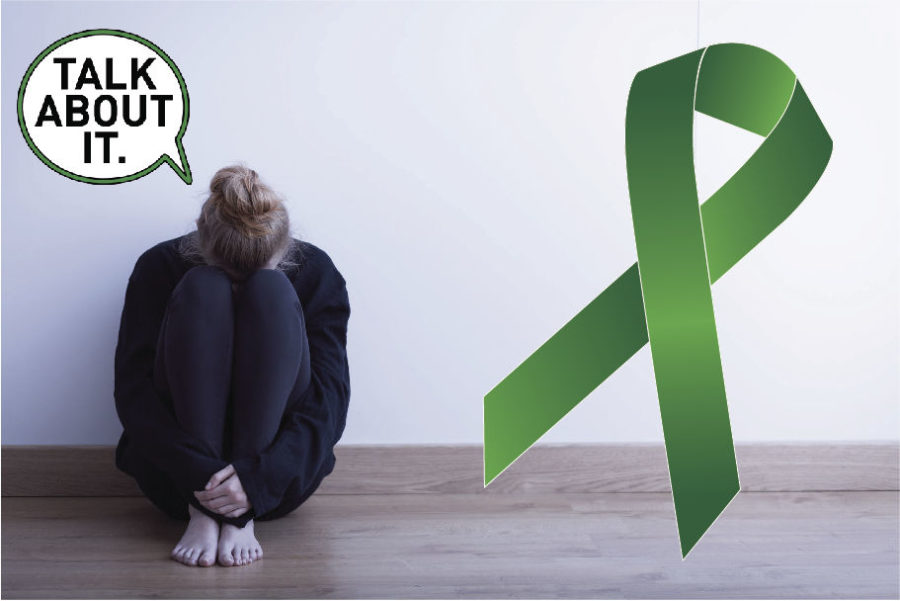Talk About It: Mental Health Awareness Day
Design by Maria Albers, photo courtesy of Getty Images
World Mental Health Day was created to bring attention to and create understanding around mental health, which isn’t traditionally seen as a disease or illness.
October 10, 2019
Editor’s note: This is part two in our weekly mental health series “Talk About It.” Sensitive content may follow.
Each year, millions of Americans face the reality of living with a mental health condition. However, mental illness affects everyone directly or indirectly through family, friends or coworkers. Despite mental illnesses’ reach and prevalence, stigmas and misunderstandings are just as widespread.
Each year on Oct. 10, participants across the country and around the world raise awareness of mental illness as part of World Mental Health Day. In the United States specifically, participants recognize the entire first week of October as Mental Illness Awareness Week.
“I think [mental health] is something that affects so much of the population that it needs to be taken more seriously,” said Rebecca Staib, president of the National Alliance on Mental Illness (NAMI) and a senior in kinesiology and health. “Just because there’s still such a stigma around mental [health] and being ‘abnormal’ and that it’s something that you should hide from other people when in reality, mental illness affects one in five adults in the United States. So the likelihood of being diagnosed with a mental illness or knowing someone who suffers from a mental illness is so high, it shouldn’t be something that’s stigmatized.”
Staib said stigmatization can come in many forms and from many different sources in a person’s life.
“Stigma can be from friends or family or even oneself thinking ‘oh because I have a mental illness I can’t do this or that,’” Staib said. “From friends or family, it can be seen as ‘you’re not trying hard enough, if you’re depressed just be happy’ when in reality it’s a chemical imbalance of the brain. So that stigmatization from others and yourself can prevent you from getting help. In some situations, it can be extremely harmful to oneself or others if gone undiagnosed or untreated.”
Staib said some of those “extremely harmful” situations individuals can get into if their illness is heavily stigmatized and goes untreated can include becoming extremely depressed and committing self-harm or suicide. She said manic episodes can cause individuals to participate in dangerous activities such as illicit drug use, unprotected sex and maxing out credit cards.
NAMI is one of the nation’s largest grassroots mental health organizations dedicated to helping the millions of Americans affected by mental illness. Staib is the president of the Iowa State branch of the organization. She said she is heavily involved in the organization because of her own experience with mental illness.
“My freshman year of high school — well, I’m a senior in college this year — my freshman year my older sister, who was a senior at the time, had attempted suicide for the first time,” Staib said. “Just our family dealing with that and kind of learning with her what mental illness was, it brought us a lot closer together; you know it was a really hard time for all of us — now my parents are amazing.”
Staib said her experience with mental illness has even gone further than just with her sister.
“Now I have noticed my symptoms a couple of years back and recently got diagnosed with generalized anxiety disorder, seasonal affective disorder and an adjustment disorder,” Staib said. “[I know] that if I need anything, I can talk to my parents and because they’ve been through it with my sister and all of her problems, they’re really supportive of me. So I guess, through those experiences I’ve become so passionate about mental health and dealing with mental illnesses. I mean if my parents can, you know, educate themselves when they’re a bit older, then why can’t I do the same thing with individuals my age?”
Staib said World Mental health Day is important for educating people because mental illness isn’t treated as a physical illness or disease when it should be. She said taking the time to check in with oneself, friends or family and advocating for mental health is important during Mental Illness Awareness Week.
On campus, NAMI has no events happening, but all around the country the organization has many events and awareness advocacy. To learn more visit the NAMI website.
In 1990, the U.S. Congress established the first full week of October as Mental Illness Awareness Week in recognition of NAMI’s efforts to raise mental illness awareness. Since then, mental health advocates across the country have joined with others in their communities to sponsor activities, large or small, for public education about mental illness.
World Mental Health Day was observed for the first time on Oct. 10, 1992. It was started as an annual activity of the World Federation for Mental Health by the then Deputy Secretary-General Richard Hunter. The day is officially commemorated every year on Oct. 10.
At the beginning, World Mental Health Day had no specific theme. Its goals were general, promoting mental health advocacy and educating the public on relevant issues. In the first three years, one of the central activities to mark the day was a two-hour global telecast. World Federation for Mental Health board members received participation from all over the world, including Australia, Chile, United Kingdom, Zambia, Swaziland, Peru, Mexico and the United States. Since then, more and more countries participate every year with events focused on mental health awareness.
Reporting contributed by Amber Mohmand.







